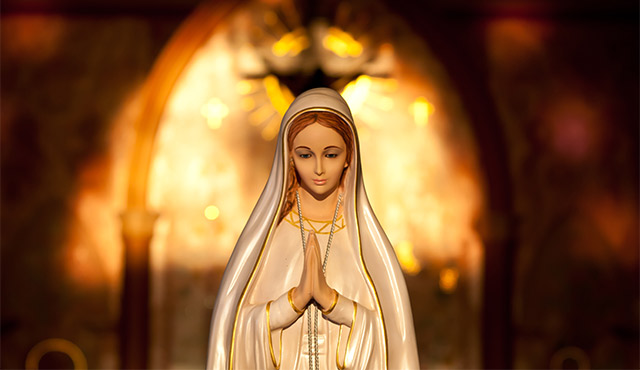This month, the 100th anniversary of Our Lady of Fatima occurred the day before Mother’s Day, a reminder that Mary lives maternity on the scale of eternity. She is the mother of God even though she is a finite being created by God who exists from all time. And she is also mother to each and every one of us.
Last week, I offered some quick thoughts on the profound notion of Mary as the Mother of God. This week, I’d like to spend a little time on the reality of Mary as our mother.
As Jesus was dying on the cross, his mission was not yet fulfilled. He had one more thing to do; he needed to give us his mother as our mother. With Mary and John at the foot of his cross, he said to her, “Woman, behold your son.” To his beloved disciple, he said, “Behold your mother.” (John 19:26-27) In this moment, not only did he provide for Mary’s earthly care; but he provided us with the most perfect mother possible.
The Gospel of Luke tells of the angel Gabriel’s appearance to Mary. She was only about thirteen years old. Consider that humanity had suffered the weight of sinfulness for thousands of years. No matter what people had done up to this point, they had not been able to heal this woundedness. Even when in the presence of God, no one in the Old Testament could give him an absolute and unconditional yes. All of his servants struggled to serve him.
But Mary thoughtfully considers the request made of her, namely to become the mother of the Messiah, which is to say the Mother of God, and she is able to give her unreserved yes. (Luke 1:38) In the moment in which she is asked this question, the promise of eternal life for all humanity hangs on her yes. Remember that she has free will. She could have said no as so many others had said no in smaller things before, as we say no each time we turn away from Our Lord. Instead, she said yes. This yes makes it possible to be his mother so that he may heal our wounded nature. The same yes eventually makes her our mother, too.
Pope Francis celebrated the 100th anniversary of Our Lady of Fatima with the canonizations of Jacinta and Francisco, two of the children to whom she appeared. His homily had a somber tone amidst a joyous occasion: “Our Lady foretold, and warned us about, a way of life that is godless and indeed profanes God in his creatures. Such a life – frequently proposed and imposed – risks leading to hell.”
Nothing could be more maternal than a woman wanting to save the lives of her children. She lives her maternity to all of us by showing us the way to her Son, the one who crushed the head of the enemy. (Gen 3:15)
Arguably, the notion of maternity has been diminished over the past century or so. At the same time, our popes have lived a lively devotion to Mary, Our Mother. When St. John Paul II became pope, in addition to dedicating his papacy to her with his motto “Totus Tuus” (“All yours”), he had an image of her put in St. Peter’s Square. Surprisingly, among all the holy people represented there, she had been left out for centuries.
He manifested his filial devotion repeatedly, even attributing to her the saving of his life during his attempted assassination on her feast, May 13, 1981: “It was a mother’s hand that guided the bullet’s path.”
On the 90th anniversary of Fatima, Pope Benedict XVI (now Father Benedict) celebrated Mass in Aparecida, Brazil’s famous Marian Shrine. He remarked on the various apparitions to different people and in different continents, “I find this very beautiful. She is always Mother of God, she is always Mary, yet she is, so to speak, ‘inculturated’: she has her face, her own special countenance, in Guadalupe, Aparecida, Fatima, Lourdes, in all the countries of the earth.”
This truly tender, refined, human archetype of maternity continues to manifest her love for us, her sons and daughters. The trust of the Father, Son, and Holy Spirit in this woman, our mother, should give us all the assurance to enter into her maternal embrace.

